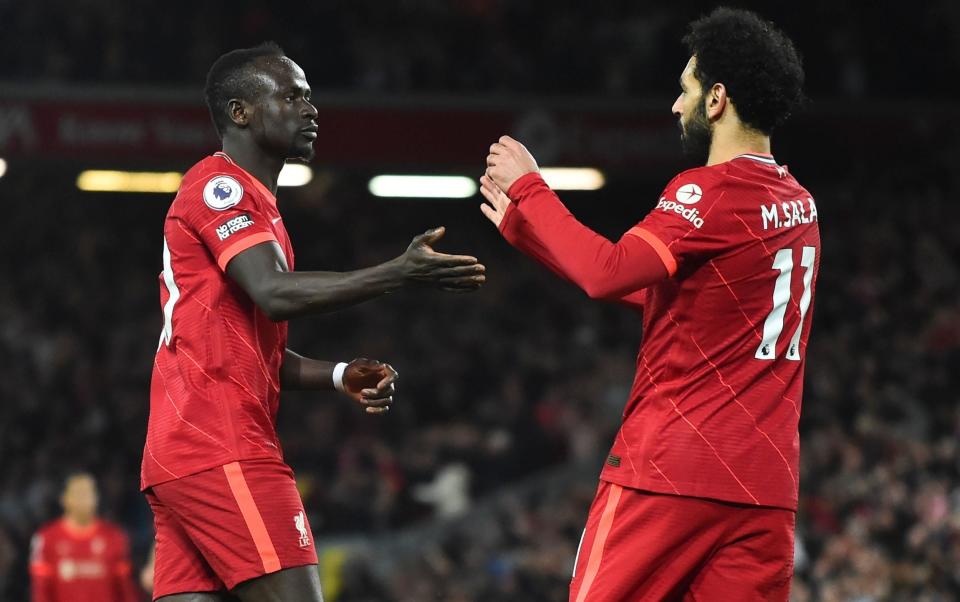Mohamed Salah and Sadio Mane’s 112,000 air miles this season put workloads under scrutiny

Liverpool's Mohamed Salah and Sadio Mane have racked up almost 112,000 air miles between them this season, according to a players' union survey demanding reform over "excessive workloads".
Having travelled the equivalent of nearly halfway to the Moon since August, this Saturday's Champions League final will also be the pair's 68th match each of an exhausting campaign.
That match tally is well over the maximum demanded by 90 per cent of high-performance coaches, who are backing no more than 55 matches per season, according to global union Fifpro.
Africa Cup of Nations duty ensured the pair spent more time in the air than ever this year. Salah recorded 37,975 miles on duty with Egypt, while Mane flew 43,087 with Senegal. For Liverpool, the pair travelled 15,281 miles each on planes.
Ahead of another arduous campaign that will have the World Cup crammed in, Fifpro warned of an increasingly unfair health burden on the players. Sixty per cent of the games played by Liverpool’s African forwards were described as being in the “critical zone”, meaning two appearances of at least 45 minutes within less than five days.
Cumulative exposure to minutes in the critical zone can have a detrimental impact on a player’s health, performance and career longevity, Fifpro said. It has called for a limit to the number of such back-to-back matches a player can feature in before a break is mandated.
'We are athletes, not machines'
"The strain on players' health reveals the crisis of governance in our sport," Fifpro said in its report launch. "A competition model, which values the players as assets but denies them proper rest and recovery, has locked us onto a path that is unsustainable and unaccountable. Reform is urgent, and the work starts here: by listening to the players and what their bodies are telling us."
Fifpro's Player Workload Monitoring (PWM) platform found that, in 2020-21, Real Madrid midfielder Luka Modric played in 24 consecutive games in the critical zone. Eighty seven per cent of 1,055 players the union surveyed in the final three months of 2021 supported the idea of a limit on critical zone matches, with a majority (51.5 per cent) saying a break should be mandated after three such games.
A total of 54 per cent said they had suffered an injury owing to excessive workload, while 82 per cent of coaches in a separate survey said they observed mental health issues with players owing to schedule overload.
Less than a quarter (22 per cent) of players feel their voice is respected in decisions concerning the football calendar, with the head of the English union Maheta Molango telling the PA news agency earlier this month there had been "zero consultation" with players over the decision to significantly increase the number of matches in the Champions League from 2024.
"We are athletes, not machines," write Inter Milan's Arturo Vidal, Lille's Jonathan David and Leonardo Bonucci, of Juventus, in the report. "Our bodies and our minds have natural limits."
More than three quarters (76 per cent) of players supported the idea of additional regulation to protect off-season breaks. Coaches favoured at least a four-week break between campaigns, plus a six-week pre-season.
A large majority (73.1 per cent) of players also said there was not a high level of collaboration between their club and national team coaches when it came to managing workload.
Harry Maguire, the Manchester United centre-back, played 19 consecutive matches from December 20, 2020, to February 21, 2021, an "excessive workload", the report added. The flight records and match numbers also include pre-season friendlies.
'Without change, we risk offering up a sub-standard product'
PFA chief executive Maheta Molango said: “Football is sleep-walking into a crisis on player welfare.
“The health and wellbeing of players is being jeopardised in the pursuit of commercial priorities and relentless competition cycles.”
“At the beginning of the season, I visited every Premier League dressing room to hear about the issues that matter to members. Scheduling and player workload was the standout concern for players, medical teams and managers across the board.
“Players instinctively want to be part of every game and every competition. But they have real concerns about their ability to maintain peak performance under current conditions.
“At present, we are simply playing too many games. Congested scheduling disrupts sleep, breaks training schedules and limits recovery. Over a sustained period, it results in more injuries and ultimately shortens careers.”
“Structured breaks are vital not just physically, but also mentally. Players have highlighted that breaks are needed to enable them to maintain focus on high-intensity competitions year-in-year-out. But, critically, breaks are also imperative to allow them sufficient time to be with family, children and loved ones.
“Change is essential on a human level. However, change is also a necessity on a commercial level. Football is currently the number one sport globally, but right now, the product is being put at risk.
“Without change, we risk offering up a sub-standard product and saturating the fans on the current trajectory.
“We need urgent intervention and want to see established minimum standards respected by all leagues and federations. This should include a ringfenced summer break enforced globally and protected breaks within the season.
“Football urgently needs to adopt a ‘player first’ approach to protect the long-term interests of the game.”

 Yahoo Sport
Yahoo Sport 





































